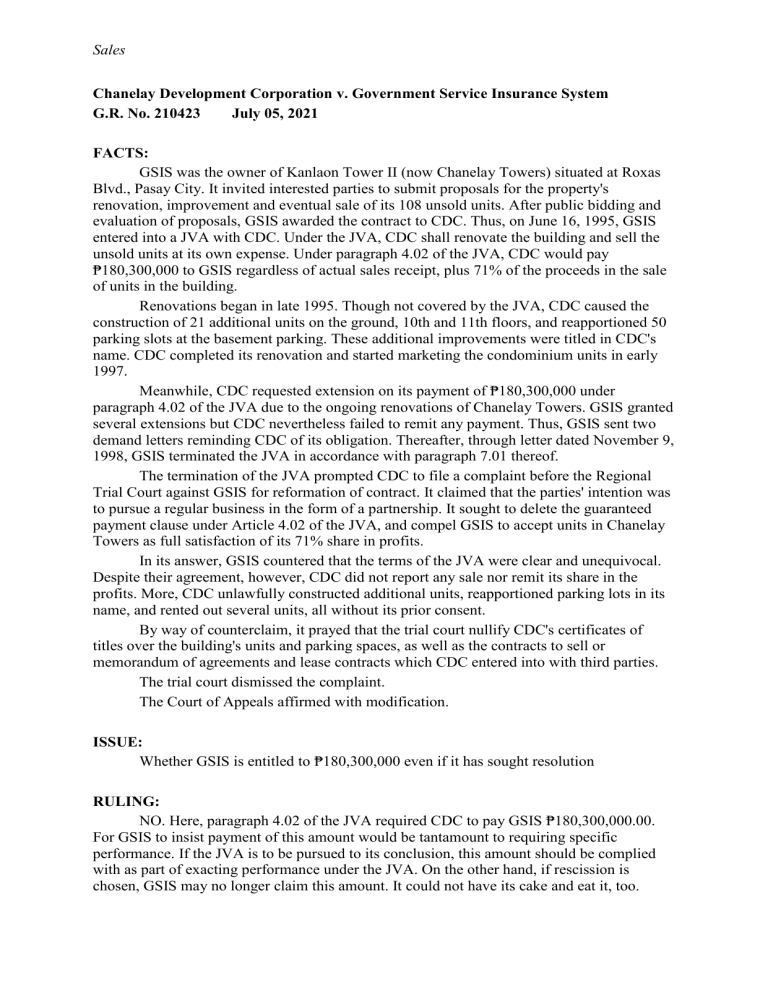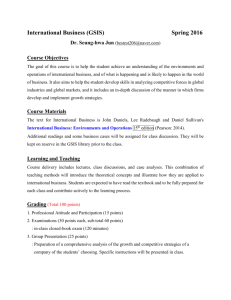37 Chanelay Development Corporation v. Government Service Insurance System
advertisement

Sales Chanelay Development Corporation v. Government Service Insurance System G.R. No. 210423 July 05, 2021 FACTS: GSIS was the owner of Kanlaon Tower II (now Chanelay Towers) situated at Roxas Blvd., Pasay City. It invited interested parties to submit proposals for the property's renovation, improvement and eventual sale of its 108 unsold units. After public bidding and evaluation of proposals, GSIS awarded the contract to CDC. Thus, on June 16, 1995, GSIS entered into a JVA with CDC. Under the JVA, CDC shall renovate the building and sell the unsold units at its own expense. Under paragraph 4.02 of the JVA, CDC would pay ₱180,300,000 to GSIS regardless of actual sales receipt, plus 71% of the proceeds in the sale of units in the building. Renovations began in late 1995. Though not covered by the JVA, CDC caused the construction of 21 additional units on the ground, 10th and 11th floors, and reapportioned 50 parking slots at the basement parking. These additional improvements were titled in CDC's name. CDC completed its renovation and started marketing the condominium units in early 1997. Meanwhile, CDC requested extension on its payment of ₱180,300,000 under paragraph 4.02 of the JVA due to the ongoing renovations of Chanelay Towers. GSIS granted several extensions but CDC nevertheless failed to remit any payment. Thus, GSIS sent two demand letters reminding CDC of its obligation. Thereafter, through letter dated November 9, 1998, GSIS terminated the JVA in accordance with paragraph 7.01 thereof. The termination of the JVA prompted CDC to file a complaint before the Regional Trial Court against GSIS for reformation of contract. It claimed that the parties' intention was to pursue a regular business in the form of a partnership. It sought to delete the guaranteed payment clause under Article 4.02 of the JVA, and compel GSIS to accept units in Chanelay Towers as full satisfaction of its 71% share in profits. In its answer, GSIS countered that the terms of the JVA were clear and unequivocal. Despite their agreement, however, CDC did not report any sale nor remit its share in the profits. More, CDC unlawfully constructed additional units, reapportioned parking lots in its name, and rented out several units, all without its prior consent. By way of counterclaim, it prayed that the trial court nullify CDC's certificates of titles over the building's units and parking spaces, as well as the contracts to sell or memorandum of agreements and lease contracts which CDC entered into with third parties. The trial court dismissed the complaint. The Court of Appeals affirmed with modification. ISSUE: Whether GSIS is entitled to ₱180,300,000 even if it has sought resolution RULING: NO. Here, paragraph 4.02 of the JVA required CDC to pay GSIS ₱180,300,000.00. For GSIS to insist payment of this amount would be tantamount to requiring specific performance. If the JVA is to be pursued to its conclusion, this amount should be complied with as part of exacting performance under the JVA. On the other hand, if rescission is chosen, GSIS may no longer claim this amount. It could not have its cake and eat it, too. Sales Indubitably, GSIS chose rescission rather than specific performance. It opted to invoke 7.01 of the JVA and terminated the agreement due to CDC's countless violations thereof rather than collect payment. Consequently, the ₱180,300,000.00 monetary award is no longer available to GSIS. As correctly ruled by the Court of Appeals, such award could have only been given to GSIS had it chosen to continue with the JVA. In Asuncion v. Evangelista, the Court reiterated the rule that persons prejudiced may elect between exacting fulfillment of the obligation (specific performance) and its resolution, but they are not entitled to pursue both of these mutually exclusive, nay inconsistent remedies. Let us be clear, however, that GSIS resorted to rescission under Article 1191 of the Civil Code, not under Article 1381 as the CDC would have us believe. Article 1191, as presently worded, speaks of the remedy of rescission in reciprocal obligations within the context of Article 1124 of the Old Civil Code which uses the term "resolution". The remedy of resolution applies only to reciprocal obligations such that a party's breach thereof partakes of a tacit resolutory condition which entitles the injured party to rescission. The present article, as in the Old Civil Code, contemplates alternative remedies for the injured party who is granted the option to pursue, as principal actions, either a rescission or specific performance of the obligation, with payment of damages in each case. On the other hand, rescission under Article 1381 of the Civil Code, taken from Article 1291 of the Old Civil Code, is a subsidiary action, and is not based on a party's breach of obligation. Here, the JVA involved reciprocal obligations wherein CDC was obligated, inter alia, to renovate the Chanelay Towers, market its unsold units, and remit payment to GSIS. In exchange, GSIS was to transfer possession of the property to CDC. GSIS complied with its obligation; CDC did not. Thus, GSIS invoked its right to rescission under Article 1191 of the Civil Code as embodied in paragraph 7.01 of the JVA. In Laperal v. Solid Homes, Inc. the Court recognized the right of parties to stipulate on extrajudicial rescission under Article 1191, allowing parties to freely determine and stipulate under what terms and conditions the rescission may be invoked and its effect. In this case, such terms and conditions are embodied in paragraph 7.01 of the JVA. The provision clearly did not provide for the application of Article 1385 of the Civil Code on the mutual restitution of things received by the parties.

